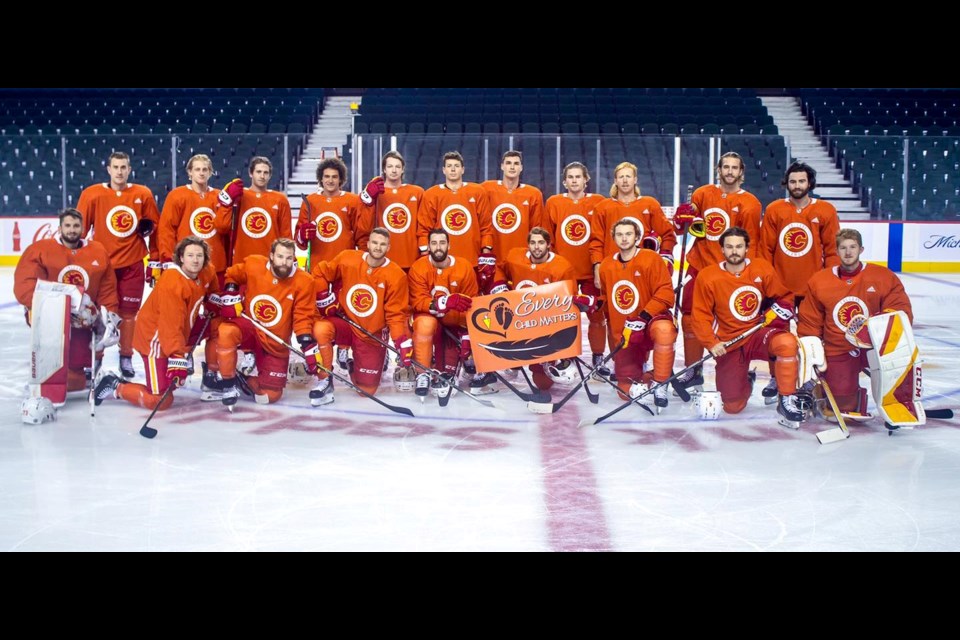ÎYÂRHE NAKODA – Some in Treaty 7 territory will notice the Calgary Flames' pre-game ceremonies have differed from those of other NHL teams in Canada.
The Flames are the only Canadian NHL team that has not yet incorporated an Indigenous land acknowledgement before the puck drops at home games, and some traditional territory holders of Treaty 7 believe it’s time they did.
“If they haven’t done it yet or started discussing it, it kind of brings the question as to why hasn’t it happened yet?” said Jordie Mark, a Chiniki First Nation councillor on Îyârhe (Stoney) Nakoda First Nation’s tribal council.
“Maybe there’s something they’re doing that’s low-key, but if they can bring a land acknowledgement to the mainstream with as big a platform as theirs is, it would be a huge recognition for Indigenous peoples of the area, especially for our youth.”
The Vancouver Canucks and Ottawa Senators were the first Canadian teams to implement land acknowledgements before games in 2019. The Montreal Canadiens, Winnipeg Jets, Toronto Maple Leafs and Edmonton Oilers followed suit at the start of the 2021-22 season, at which point the Oilers hired Cree artist Lance Cardinal, of Bigstone Cree Nation in Treaty 8 territory, to act as an Indigenous consultant for the organization.
As one of his first orders of business, Cardinal developed an Indigenous land acknowledgement with respect to Treaty 6 territory holders, to be read before the start of each home game moving forward. It was read for the first time in a pre-recorded video by Chief Wilton Littlechild, a former commissioner for the Truth and Reconciliation Commission at an Oilers game on Oct. 13, 2021.
Kirsten Ryder, of Îyârhe Nakoda First Nation, said she doesn’t understand why the Flames have yet to follow in the footsteps of the Oilers and other NHL teams, noting the amount of support the Calgary team receives from Indigenous peoples.
“They are No. 1 on my list and have been for a very long time,” said Ryder, who has been involved in the hockey community for many years as a player and as a parent. “There are tons of Flames fans who are Indigenous.
“I don’t know why they don’t do a land acknowledgement, but I think it’s time they do. It only makes sense to do one on Treaty 7 lands.”
Ryder said she would like to see the Flames organization take a similar approach to the Oilers, engaging with treaty signatories including the Îyârhe Nakoda, encompassing Bearspaw, Chiniki and Goodstoney First Nations; the Blackfoot Confederacy, including Kainai, Piikani and Siksika Nations; Tsuut’ina Nation and the Métis Nation of Alberta Region 3.
“I think the first step is just more of sharing an understanding of why one should be done and why it’s important,” she said.
Ryder suggested Flames leadership take a closer look at their organization and assess what more they could be doing to work toward reconciliation.
“I hope a land acknowledgement is introduced, but Indigenous people will know if it’s just tokenism,” she said. “Hopefully they consult with some of the many Treaty 7 leaders, knowledge holders and elders who can contribute to that.
“It’s on the Flames to do that.”
Indigenous peoples and their traditional lands share a unique and enduring relationship throughout history, something that is recognized in land acknowledgements.
To acknowledge the land is an expression of gratitude to the Indigenous peoples who have lived here since time immemorial – honouring those in the past and the present.
A formal reading, identifying all Treaty 7 Nations and honouring their connections to the land, takes less than a minute, but can go far in the spirit of reconciliation.
“I think it’d be a huge recognition. It’s something that instills pride in our community and in our youth,” Mark said.
“It would mean a lot to the First Nations communities surrounding Calgary and for Treaty 7 in itself, it would go a long way.”
The Flames have publicly supported Indigenous initiatives in the past. In 2021 and 2022, the team wore orange jerseys during practice skates in lieu of the National Day for Truth and Reconciliation and they have also supported the Morley Community School Mustangs as well as other Indigenous-led hockey programs.
The Flames did not respond to the Outlook’s request for comment in time for publication.
The Local Journalism Initiative is funded by the Government of Canada. The position covers Îyârhe (Stoney) Nakoda First Nation and Kananaskis Country.



